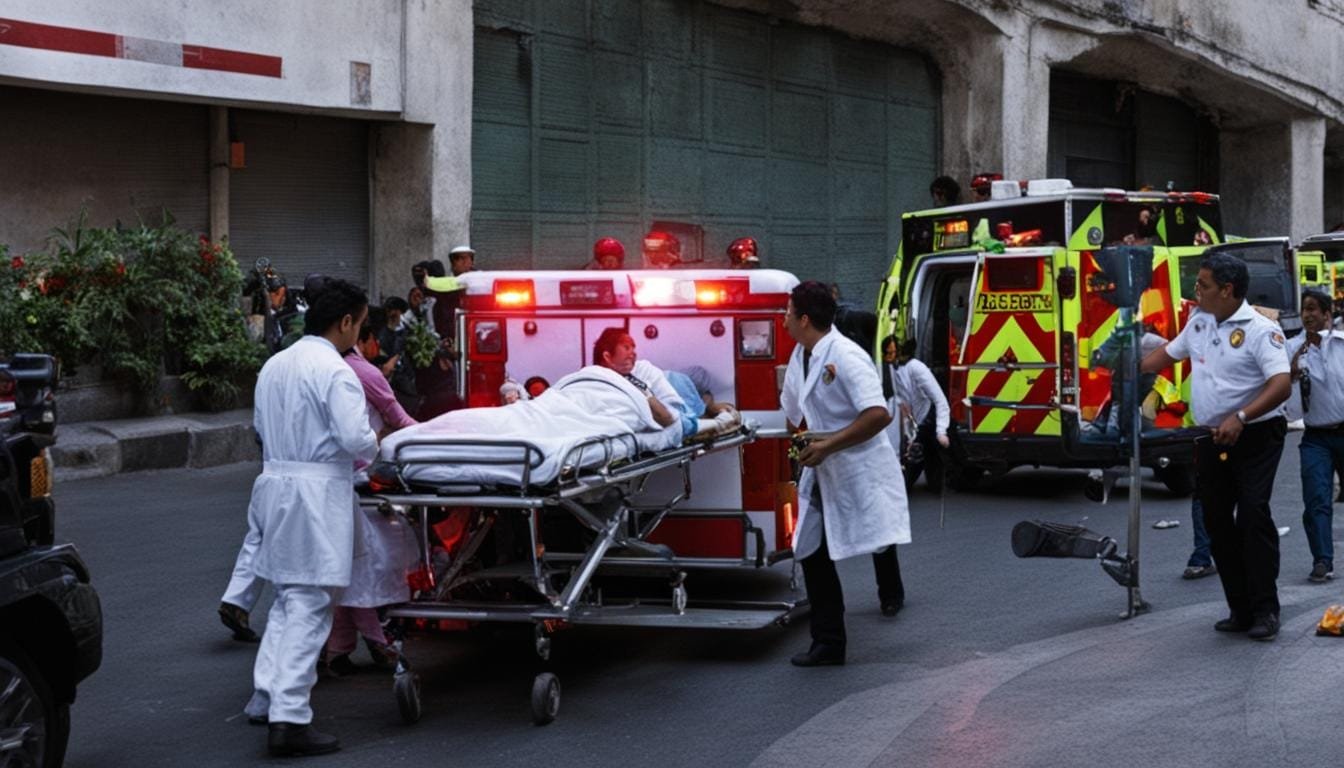Welcome to our quick guide on emergency medical care in Mexico. Whether you’re planning a vacation or traveling for business, it’s essential to be prepared for any medical emergencies that may arise during your stay. Mexico’s healthcare system has its unique challenges and options, and understanding them can help you navigate the healthcare landscape more effectively.
From the bustling cities to the tranquil coastal towns, Mexico offers a diverse range of experiences. However, when it comes to emergency medical care, it’s important to be aware that the quality and accessibility of healthcare facilities can vary.
Let’s explore the challenges, options, and important considerations for emergency medical care in Mexico. Whether it’s understanding the challenges of the healthcare system, knowing where to seek medical help, or dealing with language barriers, we’ve got you covered!
Key Takeaways:
- Know the challenges of Mexico’s healthcare system, including inconsistent quality and limited access to medical facilities in rural areas.
- Be prepared to seek emergency medical care by understanding the available options, such as pharmacy doctors, hotel doctors, public hospitals, and private facilities.
- Consider obtaining comprehensive travel insurance to cover potential medical expenses and emergencies, including medical evacuation if necessary.
- Be aware of language and cultural barriers that may arise when communicating with healthcare providers, and consider using translation tools if needed.
- Plan ahead for medical evacuations in severe emergencies and understand your insurance coverage for these situations.
Challenges of Medical Care in Mexico
In Mexico, the healthcare system poses various challenges that individuals should be aware of when seeking emergency healthcare or urgent medical services. These challenges can impact the quality of care, financial aspects, communication with healthcare providers, and accessibility to medical facilities, particularly in rural areas.
The Ranking and Quality of Healthcare in Mexico
Mexico’s healthcare ranking is below average, which means that the overall quality of care can be inconsistent. While some facilities near major tourist destinations offer better services, others may not meet international standards. It’s important to understand that healthcare facilities in Mexico may not always possess the same level of equipment, resources, or expertise as those in your home country.
Financial Challenges and Upfront Payments
Another challenge in Mexico’s healthcare system is the demand for upfront payment for medical services. In some cases, you may be required to pay for your healthcare expenses before receiving treatment. This can lead to financial challenges, especially if you are in a critical situation and require immediate medical attention.
Language Barriers and Effective Communication
When seeking healthcare in Mexico, language barriers can hinder effective communication with healthcare providers. While some medical professionals may speak English, it is common to encounter healthcare staff who primarily speak Spanish. This language barrier can make it challenging to fully understand your medical condition, discuss symptoms, or ask questions about your treatment plan.
Limited Accessibility in Rural Areas
Access to medical facilities and qualified staff is limited in rural areas of Mexico. This means that individuals residing or traveling outside major cities may face difficulties in accessing emergency healthcare or urgent medical services. Long distances and limited transportation options can further complicate the situation, potentially delaying prompt medical attention.
Understanding these challenges is essential for navigating the healthcare system effectively in Mexico. By being aware of the potential obstacles and planning accordingly, individuals can make informed decisions in case of a medical emergency or urgent healthcare need.
| Challenges | Impact |
|---|---|
| Quality of care | Inconsistent standards |
| Financial demands | Upfront payment requirement |
| Language barriers | Difficulty in effective communication |
| Accessibility in rural areas | Limited medical facilities |
Seeking Emergency Medical Care in Mexico
In case of an emergency, immediate medical attention is crucial. Just like in the United States, you can call 911 in Mexico for emergency assistance. However, it’s important to note that private ambulances in Mexico are typically not free and may require payment upfront.
If you are facing non-emergency medical issues, you have several options to receive the care you need. Here are some options to consider:
- Pharmacy Doctors: Many pharmacies in Mexico have in-house doctors, known as “Pharmacy consultorios,” who can provide consultations and prescribe medication for minor illnesses or injuries. Wait times are generally around an hour, making it a convenient and affordable option.
- Public Healthcare Facilities: Mexico has a public healthcare system that offers medical services at a lower cost. While the quality of care can be good, larger hospitals may have long wait times. Smaller clinics may have shorter wait times but limited diagnostic equipment.
- Private Healthcare Facilities: Private healthcare facilities in Mexico provide high-quality care with shorter wait times. These facilities often require appointments and have state-of-the-art equipment. English-speaking staff is also available for better communication.
When seeking medical care, it’s important to assess the severity of your condition and choose the appropriate level of care. Minor ailments and injuries can often be treated by pharmacy doctors, while more serious conditions may require the attention of a public or private healthcare facility.
Remember, in case of a medical emergency, the priority is to seek immediate medical attention. Assess your options wisely and act promptly to ensure your well-being.
Pharmacy Doctors in Mexico
When it comes to minor illnesses or injuries, many pharmacies in Mexico provide a convenient and affordable option for medical assistance. These pharmacies often have in-house doctors, known as pharmacy consultorios, who can offer consultations and prescribe medication. While they may not have extensive equipment or English-speaking staff, they can efficiently address common ailments and provide valuable guidance.
One of the benefits of pharmacy consultorios is their accessibility. With numerous pharmacies located throughout Mexico, you can easily find one in close proximity to your location. Additionally, the wait times at these facilities are typically reasonable, averaging around an hour. This quick access to medical help can be especially valuable in non-emergency situations.
While pharmacy doctors may not have the same resources as larger medical facilities, they are well-equipped to handle minor ailments. They can effectively treat conditions such as colds, flu, allergies, minor infections, and provide basic wound care. Furthermore, if your condition requires further evaluation or specialized care, these pharmacy doctors can refer you to a more suitable facility.
To give you a better understanding of the advantages and limitations of pharmacy doctors in Mexico, here is a brief overview:
Advantages of Pharmacy Doctors in Mexico:
- Convenient and easily accessible
- Affordable consultations and medication
- Short wait times (typically around an hour)
- Capable of treating common minor ailments
Limitations of Pharmacy Doctors in Mexico:
- Limited diagnostic equipment
- May not have English-speaking staff
- Not suitable for severe or life-threatening conditions
Despite their limitations, pharmacy doctors in Mexico can serve as a valuable first point of contact for medical assistance. Their expertise in handling minor ailments, coupled with their accessibility, makes them an excellent option for non-emergency situations.
Next, we’ll explore another healthcare option available in Mexico: hotel doctors. These on-site medical professionals are convenient for travelers seeking immediate medical attention while staying at hotels.
Hotel Doctors in Mexico
When it comes to medical emergencies in Mexico, some hotels go the extra mile to ensure the well-being of their guests. These hotels have on-site doctors who can provide medical assistance when needed, offering convenience and peace of mind.
One of the advantages of seeking medical care from hotel doctors is the availability of English-speaking healthcare providers. This reduces language barriers and allows for better communication, ensuring that your medical needs are effectively understood and addressed.
However, it’s important to note that the level of care provided by hotel doctors may be limited. While they can attend to minor ailments and provide essential medical services, they may not have access to specialized equipment and resources required for more complex procedures or emergencies.
Another consideration when seeking medical assistance from hotel doctors is the cost. Compared to pharmacy consultorios, hotel doctors often charge higher fees for their services. Therefore, it’s advisable to assess the severity of your condition and consider the availability of more suitable healthcare options.
Benefits of Hotel Doctors in Mexico
Despite the limitations, hotel doctors can be a convenient option for minor medical needs. Here are some benefits to consider:
- Convenience: Having a doctor available on-site minimizes the need for travel and allows for immediate attention within the comfort of your hotel.
- English-speaking doctors: Language barriers are reduced, ensuring effective communication and understanding of your medical concerns.
- Rapid response: Hotel doctors are readily accessible, providing prompt medical attention when time is of the essence.
Limitations of Hotel Doctors in Mexico
While hotel doctors offer convenience, it’s essential to be aware of their limitations:
- Limited resources: Hotel facilities may not have the same level of equipment and medical resources as dedicated hospitals or clinics.
- Specialized care: Some medical conditions may require specialized treatment or access to medical specialists that may not be available through hotel doctors.
- Cost: Hotel doctors often charge higher fees compared to other healthcare options, so it’s important to be prepared for potential expenses.
Awareness of the benefits and limitations of seeking medical care from hotel doctors in Mexico can help you make informed decisions in case of a medical emergency during your stay. It’s always advisable to assess the seriousness of your condition and consider consulting with other healthcare providers or facilities when appropriate.
| Pros | Cons |
|---|---|
| Convenience | Limited resources |
| English-speaking doctors | Specialized care may not be available |
| Rapid response | Higher cost compared to other options |
Public Doctors and Hospitals in Mexico
Mexico’s public healthcare system offers medical services at a more affordable cost compared to private facilities. While the quality of care can be good, it’s important to be aware of certain considerations when seeking medical assistance in Mexico.
In larger public hospitals, wait times can be long due to the high volume of patients. However, smaller clinics may offer shorter wait times for non-emergency cases. It’s important to note that these smaller clinics may have limited diagnostic equipment and resources compared to larger hospitals.
One challenge that travelers may face is the language barrier. Public doctors and hospitals may not have English-speaking staff, making communication difficult. It’s always helpful to have a basic understanding of Spanish or consider using translation apps or services to ensure effective communication with healthcare providers.
Despite these challenges, Mexico’s public healthcare system can still provide appropriate medical care for various conditions. Here is an overview of the benefits and limitations of public doctors and hospitals in Mexico:
- Lower cost compared to private healthcare facilities
- Good quality of care
- Availability of specialized medical services
- Long wait times, especially in larger hospitals
- Limited diagnostic equipment in smaller clinics
- Language barrier with limited English-speaking staff
Example Table: Comparison of Public and Private Healthcare Facilities in Mexico
| Facility Type | Cost | Wait Times | Diagnostic Equipment | Language Accessibility |
|---|---|---|---|---|
| Public Hospitals | Lower cost | Longer wait times | Varies by hospital | Limited English-speaking staff |
| Private Hospitals | Higher cost | Shorter wait times | Advanced diagnostic equipment | English-speaking staff available |
It’s important to weigh the pros and cons of public doctors and hospitals in Mexico based on your specific needs and circumstances. If language fluency is a concern, private healthcare facilities may be a more suitable option. However, if cost is a priority and you can navigate the language barriers, public doctors and hospitals can provide adequate medical assistance in Mexico.
Private Doctors and Hospitals in Mexico
Private healthcare facilities in Mexico provide excellent medical care for emergencies, ensuring shorter wait times compared to public healthcare options. These facilities are equipped with state-of-the-art technology and have English-speaking staff, making communication easier for international patients.
While private healthcare services offer many advantages, it’s important to note that they come at a higher cost. Unlike public healthcare facilities, payment is typically required upfront at private clinics and hospitals. However, the quality of care and the convenience of scheduling appointments make private healthcare a viable choice for those seeking prompt and efficient medical attention.
Private healthcare facilities in Mexico offer high-quality care with shorter wait times, state-of-the-art equipment, and English-speaking staff.
Benefits of Private Doctors and Hospitals in Mexico
Choosing a private doctor or hospital in Mexico can provide several benefits, including:
- Access to top-rated medical professionals
- State-of-the-art facilities and technology
- Shorter wait times for consultations, tests, and procedures
- English-speaking staff for seamless communication
- Personalized care and attention
- Flexible appointment scheduling
Private doctors and hospitals cater to both local and international patients, offering a wide range of medical services, including emergency care, surgeries, diagnostic tests, and specialized treatments. They adhere to high standards of healthcare delivery, ensuring patient satisfaction and successful outcomes.
Choosing a private healthcare facility in Mexico can provide peace of mind and quick access to emergency healthcare when you need it the most.
Key Points to Consider
When opting for private healthcare in Mexico, keep the following points in mind:
- Cost: Private healthcare services are generally more expensive than public healthcare options. Ensure you have adequate travel insurance coverage to handle any medical expenses.
- Payment: Payment is typically required upfront at private clinics and hospitals. Be prepared to pay for services before receiving treatment.
- Insurance Coverage: Check if your travel insurance policy covers private healthcare services in Mexico. Review the terms and conditions to understand what medical expenses are reimbursable.
- Emergency Assistance: Private doctors and hospitals can provide immediate medical attention during emergencies, ensuring timely and efficient care.
By considering these factors, you can make a well-informed decision about utilizing private healthcare services in Mexico.
Insurance and Billing in Mexico
When planning a trip to Mexico, it is highly recommended to have comprehensive travel insurance that covers medical expenses. Your American insurance may not provide the same level of coverage abroad, and navigating the Mexican healthcare system can be challenging without proper insurance.
Medical travel insurance can offer the peace of mind you need in case of a medical emergency. It typically covers a range of services, including medical assistance, repatriation, evacuation, and even legal fees if necessary.
When seeking medical treatment in Mexico, it’s important to ask for a factura, a special receipt that itemizes the medical services provided. This is especially essential if you plan to seek reimbursement from your insurance provider. The factura provides documentation that helps facilitate the reimbursement process and ensures that you are adequately covered for your medical expenses.
Comprehensive travel insurance can protect you from unexpected medical costs and provide access to quality healthcare services. It is an essential investment that can offer financial security and peace of mind during your trip to Mexico.
Here is a summary of the benefits of having travel insurance in Mexico:
- Financial protection against unexpected medical expenses
- Coverage for repatriation and evacuation
- Access to quality healthcare services
- Assistance with legal fees, if necessary
Remember, accidents and medical emergencies can happen anywhere. Be prepared and ensure that you have the necessary insurance coverage to receive the medical assistance you may need while in Mexico.
| Insurance Benefits | Comprehensive Travel Insurance | American Insurance |
|---|---|---|
| Coverage for Medical Expenses | Yes | Varies |
| Repatriation and Evacuation Services | Yes | Varies |
| Coverage for Legal Fees | Yes | No |
| Access to Quality Healthcare Services | Yes | Varies |
Language and Cultural Barriers in Mexican Healthcare
When seeking medical assistance in Mexico, it’s important to be aware of the potential language and cultural barriers that can arise. Communication plays a crucial role in receiving timely and appropriate medical emergency services in Mexico.
Language Challenges:
One of the main difficulties faced by non-native speakers in Mexican healthcare settings is the use of colloquial language and idioms. Mexicans often speak informally, which can make it challenging to understand medical terminology and instructions.
Furthermore, medical emergencies require quick and accurate communication. Language barriers can lead to delays in receiving life-saving treatment and misunderstandings about medical conditions.
To overcome these language challenges, it’s essential to:
- Use visual cues: Non-verbal communication, such as pointing or gesturing, can help bridge the language gap.
- Be flexible: Patience and understanding are key when interacting with healthcare providers who may not speak English fluently.
- Consider translation tools: Utilizing translation apps or carrying a medical phrasebook can facilitate communication during medical emergencies.
Cultural Differences:
In addition to language barriers, understanding and navigating cultural differences can also impact the medical assistance experience in Mexico. Cultural norms and practices may differ from what you are accustomed to and can influence healthcare interactions.
Some important cultural considerations include:
- Personal space: Mexicans generally have a closer proximity when communicating. Respect personal space while maintaining effective communication.
- Politeness and respect: Politeness is highly valued in Mexican culture, so ensuring a respectful and non-confrontational approach is essential.
- Family involvement: Family plays an important role in Mexican healthcare decisions. Be prepared for family members to be present during consultations or medical procedures.
Remember, effective communication is crucial in medical emergencies. By being aware of language barriers and cultural differences, you can help ensure a smoother and more efficient healthcare experience in Mexico.
Example Phrases for Medical Communication in Spanish:
| English | Spanish |
|---|---|
| I need medical assistance. | Necesito asistencia médica. |
| I have a medical emergency. | Tengo una emergencia médica. |
| I am allergic to penicillin. | Soy alérgico(a) a la penicilina. |
| Where is the nearest hospital? | ¿Dónde está el hospital más cercano? |
| My blood pressure is high. | Tengo la presión arterial alta. |
| I have a fever. | Tengo fiebre. |
Emergency Medical Evacuation from Mexico
In severe medical emergencies, it may be necessary to arrange for medical evacuation from Mexico to ensure patients receive specialized care or return to their home countries for ongoing treatment. Medical evacuation services can be costly, so having comprehensive travel insurance that covers these expenses is highly advisable. It’s crucial to plan ahead and understand your insurance coverage to navigate the coordination and logistics involved in medical evacuations.
When faced with a medical emergency in Mexico that requires evacuation, it’s important to consider the following:
- Consult your insurance provider: Determine if your travel insurance policy includes coverage for emergency medical evacuation. Review the terms and conditions of your policy to understand the extent of coverage provided.
- Contact your embassy or consulate: Reach out to your country’s embassy or consulate in Mexico for guidance and assistance in arranging medical evacuation. They can provide information on recommended service providers and help facilitate the process.
- Understand the process: Familiarize yourself with the steps involved in medical evacuation, such as obtaining medical documentation, coordinating transportation, and ensuring seamless transition to a suitable healthcare facility.
- Coordinate with healthcare providers: Work closely with your treating healthcare professionals in Mexico to ensure a smooth transfer of medical records and essential information to the receiving facility.
Remember, medical evacuation services require careful planning and communication between multiple parties to ensure the safety and well-being of the patient. By being proactive and informed, you can effectively navigate emergency medical care in Mexico and access the necessary resources for a successful evacuation.
| Benefits of Medical Evacuation | Considerations for Medical Evacuation |
|---|---|
|
|
Conclusion
When traveling to Mexico, it’s crucial to be prepared for potential medical emergencies. Understanding the challenges and options for emergency healthcare in Mexico can greatly assist in making informed decisions when faced with an urgent situation.
One of the most important steps is to have comprehensive travel insurance that covers medical emergencies. This ensures that you have financial protection and access to quality medical care when needed. Familiarize yourself with your insurance coverage, including medical evacuation services, to guarantee peace of mind during your trip.
Being aware of the available healthcare options in Mexico is also vital. While public hospitals provide cost-effective care, there may be long waiting times and language barriers. Private facilities offer shorter wait times, state-of-the-art equipment, and English-speaking staff, but they can be more expensive. Consider your needs and budget to choose the appropriate level of care.
In summary, by planning ahead, having travel insurance, and being knowledgeable about healthcare options, you can ensure prompt and effective medical care in case of an emergency in Mexico. Stay safe and enjoy your travels!
FAQ
What is the quality of healthcare in Mexico?
Mexico’s healthcare system has varying levels of quality, with facilities near major tourist attractions generally offering better service. However, there is a shortage of hospitals and medical staff in rural areas, which can affect the quality of care.
What challenges can I expect when seeking medical care in Mexico?
Patients in Mexico may experience long wait times and overcrowded facilities, especially in public healthcare settings. There may also be language barriers and inconsistencies in the quality of care.
What should I do in case of a medical emergency in Mexico?
In case of a medical emergency, you can call 911 in Mexico, just like in the United States. However, private ambulances in Mexico are typically not free and may require upfront payment. It’s important to assess the severity of your condition and choose the appropriate level of care.
Are there doctors available in pharmacies in Mexico?
Many pharmacies in Mexico have in-house doctors who can provide consultations and prescribe medication for minor illnesses or injuries. These pharmacy consultorios are convenient and affordable, though they may not have extensive equipment or English-speaking staff.
Can I find on-site doctors at hotels in Mexico?
Some hotels in Mexico have on-site doctors who can attend to guests’ medical needs. These facilities may be more expensive than pharmacy consultorios, but they offer the advantage of English-speaking doctors. However, the level of care may be more suitable for minor ailments.
What is the public healthcare system like in Mexico?
Mexico has a public healthcare system that provides medical services at a lower cost. However, there may be long wait times, especially in larger hospitals. Smaller clinics may have shorter wait times but limited diagnostic equipment. Public doctors and hospitals may not have English-speaking staff, so communication can be challenging.
Can I seek private healthcare in Mexico?
Private healthcare facilities in Mexico offer high-quality care with shorter wait times. These facilities have state-of-the-art equipment and English-speaking staff. However, they are more expensive compared to public healthcare options and typically require upfront payment.
Do I need travel insurance when visiting Mexico?
It is highly recommended to have comprehensive travel insurance before traveling to Mexico. Your American insurance may not cover all medical expenses abroad, and reimbursement can be complicated. Medical travel insurance can provide coverage for medical expenses, including repatriation, evacuation, and legal fees.
What are the language and cultural barriers in Mexican healthcare?
Communicating effectively with healthcare providers in Mexico can be challenging due to language and cultural barriers. Mexicans often speak colloquially, using idioms that may be difficult for non-native speakers to understand. Language barriers can lead to delays in receiving treatment and misunderstandings about medical conditions.
What should I do in case of a severe medical emergency in Mexico?
In severe medical emergencies, medical evacuation may be necessary to transfer patients to specialized hospitals or their home countries for ongoing care. Medical evacuation services can be costly, so it’s advisable to have comprehensive travel insurance that covers these expenses.
How can I be prepared for potential medical emergencies in Mexico?
It’s important to be prepared by having comprehensive travel insurance, knowing your rights as a patient, and being aware of the available healthcare options in Mexico. Understanding the challenges and possible solutions can help you make informed decisions in case of an emergency.



